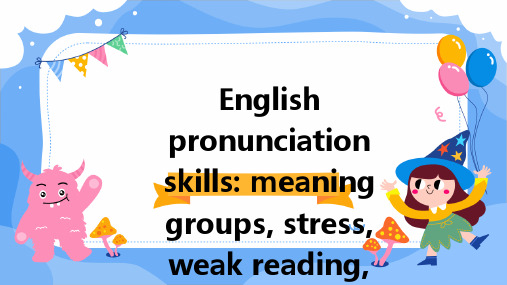英语意群、重读、弱读、连读、爆破和语调共87页
合集下载
英语句子重音、语调、连读、弱读、爆破及意群 教学PPT

• He ‘isn’t a tech ‘nician.
• 3. be用在一般疑问句句首时,重读与否均可: • ‘Is he a ‘worker? • Is he a ‘worker?
• 比较句中的重音 • 在比较句中,重音落在as或than后的代(名)词上: • This is better than ‘that. • John is taller than ‘Bill. • She’s as happy as a ‘lark. • He’s as sly as a ‘fox.
• You were trying, ‘weren’t you? Yes, I ‘was.
• 2. 助动词、情态动词和be动词与not连成一词时要重读:
• She ‘doesn’t ‘like the ‘weather here.
• I ‘can’t ‘speak ‘French。
• They ‘aren’t ‘waiting for us.
Note
如果前词尾辅音与后词尾辅音相同,前辅
音省略。
I was× so happy. I have got× to go. →I have gotta go.(to轻音化为ta) Do~you want× to dance? →do you wanna dance?
(to轻音化为na)
Note
以辅音结尾的单词 + h开头的单词,h不发
in an hour pick it up an hour and a half let him in
A group of people put on their coats and went out.
2.“辅音+半元音”
i. 英语语音中的/j/和/w/是半元音,如果前一个词是 以辅音结尾,后一个词是以半元音,特别是/j/开头, 此时也要连读。
英语句子重音、弱读、语调、连读、及意群

▪ 用于陈述句
降调
▪ I have already read that book. ↘
▪ That street is two miles long. ↘
▪ 用于特殊疑问句 ▪ What has happened to him? ↘ ▪ Which direction is it to the post office? ↘ ▪ 注意:特殊疑问句有时可用升调表示请别人重复刚说过的话: ▪ What is your major? ↗ ▪ Where shall we go for the holiday? ↗
不可连读的情况
当短语或从句之间按意群进行停顿时,意群与意 群之间即使有两个相邻的辅音与元音出现,也不 可连读。
▪ 9) you /jə/ ▪ What do you think?
▪ 10) your /jə/ ▪ Take your time.
▪ 11) us /əs/ ▪ Let us think it over.
▪ 12) that /ðət/ ▪ This is the house that Jack built.
maybe even good enough to come up with the next
iPhone
keeps us from turning a blind eye to corruption and to
injustice
2.“辅音+辅音”
爆破音/p/,/b/,/t/,/d/,/k/,/g/ 和摩擦音/f/,/v/,/W/, 其中任意2个相临时,前一个音会轻音化,即由相关的发音器官 做好这个发音的姿势,稍做停顿后即发后面的音。 如果这些音 在词尾,也要轻音化。
job.
英语意群、重读、弱读、连读、爆破和语调

It helps learners to familiarize themselves with the text, identify and correct pronunciation errors, and improve their overall reading and speaking skills.
02
This technique helps to improve fluency and naturalness in speech by reducing the effort required to pronounce unstressed vowels clearly.
03
Weak reading can also enhance listeners' understanding by reducing the amount of information they need to process, as unstressed vowels often do not carry as much meaning as stressed vowels.
Meaning groups are typically separated by pauses, which help to clarify the structure and meaning of the sentence.
Classification and application of pauses
04
Linking skills
The definition and function of connected reading
Relationships
Both stress and weak reading are important pronunciation skills that contribute to clear and effective communication in English. They work together to create rhythm and intonation in speech, with stress adding emphasis and weak reading reducing effort and improving fluency.
02
This technique helps to improve fluency and naturalness in speech by reducing the effort required to pronounce unstressed vowels clearly.
03
Weak reading can also enhance listeners' understanding by reducing the amount of information they need to process, as unstressed vowels often do not carry as much meaning as stressed vowels.
Meaning groups are typically separated by pauses, which help to clarify the structure and meaning of the sentence.
Classification and application of pauses
04
Linking skills
The definition and function of connected reading
Relationships
Both stress and weak reading are important pronunciation skills that contribute to clear and effective communication in English. They work together to create rhythm and intonation in speech, with stress adding emphasis and weak reading reducing effort and improving fluency.
英语意群、重读、弱读、连读、爆破和语调备课讲稿

Note
▪ 名词、实义动词、形容词、副词、数 词、指示代词、疑问词和感叹词等一 般都重读。
▪ 而冠词、介词、连词和一般性的代词 则不重读。
▪ ‘What ‘s the ‘matter? ▪ The ‘sweater is ‘beautiful. ▪ Your ‘book is on the ‘desk. ▪ He ‘started ‘counting it. ▪ He ‘usually ‘gets up at ‘six o’clock.
耐烦的口气,或表示命令等。 ▪ Are you satisfied? ↘ ▪ Will you take off your hat, please? ↘
▪ 用于罗列中最后一项之前的各项 ▪ For each incomplete sentence, there are four
choices marked A↗, B↗, C↗, and D. ↘ ▪ We study Chinese ↗, history ↗, geography ↗,
▪ That street is two milhat has happened to him? ↘ ▪ Which direction is it to the post office? ↘ ▪ 注意:特殊疑问句有时可用升调表示请别人重复刚说过的话: ▪ What is your major? ↗ ▪ Where shall we go for the holiday? ↗
助动词、情态动词和be动词是否有句子重音?
▪ 1. 助动词、情态动词和be动词一般没有句子重音,但在附加 句中可以重读,在简答句中则必须重读:
▪ He won’t do it, ‘will he? No he ‘won’t. ▪ You can do it, ‘can’t you? Yes, I ‘can. ▪ You were trying, ‘weren’t you? Yes, I ‘was. ▪ 2. 助动词、情态动词和be动词与not连成一词时要重读: ▪ She ‘doesn’t ‘like the ‘weather here. ▪ I ‘can’t ‘speak ‘French。 ▪ They ‘aren’t ‘waiting for us. ▪ He ‘isn’t a tech ‘nician.
英语意群、重读、弱读、连读、爆破和语调PPT课件

如果前一个词以元音结尾,后一个词以元音开头,这 两个音往往也要自然而不间断地连读到一起。
Do~I? You’re [juə] so~honest.
I~am Chinese. He~is very friendly to me. She wants to study~English. How~and why did you come here?
• Did you tell my ‘wife? • Did you tell ‘my wife? • Did ‘you tell my wife?
• We ‘heard ‘John ‘talking. • We ‘heard John talking. • We heard ‘John talking.
[s] + [j] → [ſ ]
God bless~you. Can~you dress~yourself?
I miss~you.
辅音[z]与[j]相邻时, 被同化为[З]:
[z] + [j] → [З ]
How was~your vacation? He says~you’re good.
3.“元音+元音”
音,与前面的辅音连读。
Tell~her I miss~her. What wil(l he) [wili]do? Ha(s he) [zi] done~it before?
Mus(t he) [ti] go? Can he [ni] do it? Should he [di] ….? Tell him to ask her…. Lea(ve him) [vim].
English. ↘
• 用于陈述句,表示疑问、怀疑、未定、猜测或期待等 • Your really want to do it? ↗ • She might have gone. ↗ • I think so. ↗
Do~I? You’re [juə] so~honest.
I~am Chinese. He~is very friendly to me. She wants to study~English. How~and why did you come here?
• Did you tell my ‘wife? • Did you tell ‘my wife? • Did ‘you tell my wife?
• We ‘heard ‘John ‘talking. • We ‘heard John talking. • We heard ‘John talking.
[s] + [j] → [ſ ]
God bless~you. Can~you dress~yourself?
I miss~you.
辅音[z]与[j]相邻时, 被同化为[З]:
[z] + [j] → [З ]
How was~your vacation? He says~you’re good.
3.“元音+元音”
音,与前面的辅音连读。
Tell~her I miss~her. What wil(l he) [wili]do? Ha(s he) [zi] done~it before?
Mus(t he) [ti] go? Can he [ni] do it? Should he [di] ….? Tell him to ask her…. Lea(ve him) [vim].
English. ↘
• 用于陈述句,表示疑问、怀疑、未定、猜测或期待等 • Your really want to do it? ↗ • She might have gone. ↗ • I think so. ↗
英语意群、重读、弱读、连读、爆破和语调24670

▪ He ‘isn’t a tech ‘nician.精选可编辑ppt
6
▪ 3. be用在一般疑问句句首时,重读与否均可:
▪ ‘Is he a ‘worker?
▪ Is he a ‘worker?
▪ 比较句中的重音
▪ 在比较句中,重音落在as或than后的代(名)词上:
▪ This is better than ‘that.
▪ John is taller than ‘Bill.
▪ She’s as happy as a ‘lark.
▪ He’s as sly as a ‘fox精.选可编辑ppt
7
逻辑重音
▪ 句子的重音总是要表现说话人的思想和他
所要表达的意思的重点。有时为了强调,
句子中几乎任何词都可以有句子重音,包
▪ 用于感叹句 ▪ What a small world! ↘ ▪ Oh! My poor Mathilde, how you’ve changed! ↘
▪ 用于选择疑问句中“or”之后的部分
▪ Do you want to ride or walk? ↘
▪ Would you like coffee or tea? ↘
and English. ↘
▪ 用于陈述句,表示疑问、怀疑、未定、猜测或期待等
▪ Your really want to do it? ↗
▪ She might have gone. ↗
▪ I think so. ↗
精选可编辑ppt
14
▪ 用于置于句首的状语短语或状语从句
▪ After dinner ↗, I read a magazine and made telephone calls. ↘
